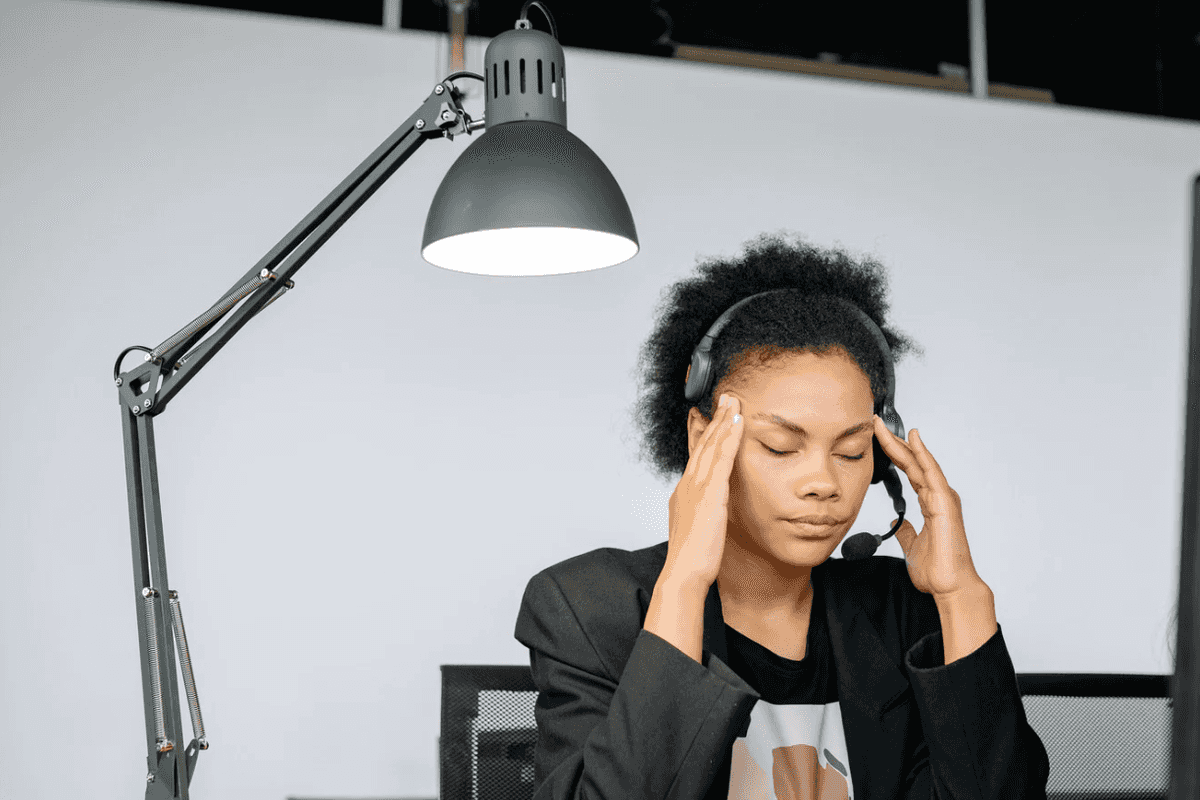Acclaimed leadership expert shares a simple hack that turns self-doubt into a huge asset
The "spotlight effect" stops people in their tracks, but it doesn't have to.
A woman sits at a desk, overwhelmed and frustrated.
Quite often, people receive a promotion, praise, or a new assignment at work and feel imposter syndrome when the stakes suddenly rise. They may feel like frauds or flukes, even though their past accomplishments are exactly what got them there. There is a feeling of being seen, paired with a fear of being "found out." If this sounds familiar, a leadership and behavioral expert has a tip to "take the spotlight off yourself and turn it into a flashlight."
Dr. Shadé Zahrai went on TikTok to advise people experiencing imposter syndrome through what's known as the "spotlight effect." To put it briefly, the spotlight effect is a mental bias that causes people to vastly overestimate how much others notice, judge, or remember them. It can make someone feel as if they are under a spotlight, anxious that others are watching closely and ready to call them out.
The truth, according to Zahrai and other experts, is that most people are too preoccupied with their own lives to notice, remember, or care enough to audit someone else. While that realization can be a relief, it still may not be enough on its own to offset imposter syndrome.
@shadezahrai If you feel like a fraud and imposter, this is why – and what to do about it. My book is out in just three days! If you order it now you get thousands of dollars of bonuses - but you have to order it before Jan 20!
Zahrai said people can flip the thought and energy of the spotlight away from their identity and aim it like a flashlight at the problem itself to find a solution. The internal narrative of "I don't know what I'm doing and I'm going to be exposed" becomes "This is the issue I'm concerned about. What do I need to do or learn to address it?" It takes "I'm a fraud" and flips it into "Why do I feel like a fraud?"
"Confidence doesn't require you to know everything in advance,” said Zahrai. "It just requires you to trust yourself enough to stay in the room, ask the question, and figure things out as you go."
@aliabdaal Have you ever heard of the spotlight effect?
Behavioral specialists weigh in
Other behavioral experts and therapists who spoke to Upworthy shared what they would recommend to someone experiencing the spotlight effect.
"So much of anxiety is perception of how others perceive you and what they're thinking about you," said licensed therapist Cristina Billingsley. "Being that [the spotlight effect] is a common occurrence for people, I remind clients there's comfort in knowing you're not alone. Reminding ourselves that this theory has been tested and research shows that people overestimate how much people are actually thinking about or noticing them. Next time you're spiraling about this, ask yourself 'Yeah....and?' Does it matter in the long run...today, tomorrow, next week? Does this person's opinion truly matter to me? Would I judge someone or be this critical about them?"
@wellwithraele Remember this for your next social interaction or conversation 💬 #wellwithraele #socialskills #perspective
Some experts agreed that the spotlight effect pivot Zahrai recommended could be used to one's personal advantage.
"Reframe the spotlight effect as a flashlight moment, turning the fear of failure and making mistakes into an opportunity to showcase your zone of genius so that others can learn from you," said Dr. Angela Chen, a clinical psychologist. "Take repeated action, as it will allow your brain to rewire the spotlight effect through exposure and extinction learning. Consistent and repeated exposure through taking steps toward what matters to you and what kind of person you strive to be allows your brain to create and strengthen new, non-threatening neural pathways."
Other experts did not think Zahrai's flashlight pivot was an effective way to eliminate the spotlight effect altogether.
"The approach of turning a spotlight into a flashlight treats the issue as attention-based instead of deep-rooted," said licensed psychotherapist Doriel Jacov. "This might work in the short-term but it doesn't address the cause of the anxiety. Many with imposter syndrome have internalized a harsh inner critic. If you simply redirect your attention, it doesn't get rid of that internalization. It might offer some temporary relief, but the inner critic will find its way back to you."
Jacov added, "Second, since the spotlight effect is fueled by negative self-perception, when you turn it into a flashlight, you might turn that negative perception outward. This leaves you judgmental and highly critical of others, which can have negative relational impacts. You may find yourself consciously or unconsciously devaluing others."
Jacov did agree with Chen that frequent exposure can help people navigate their emotions and offset the impact of the spotlight effect.
"The biggest advice I have is to put yourself in situations that elicit the spotlight," concluded Jacov. "The more you expose yourself to those feelings and that type of environment, the more you'll be able to learn that you're emotionally safe. You'll learn that no one thinks of you in the way you think of yourself."

